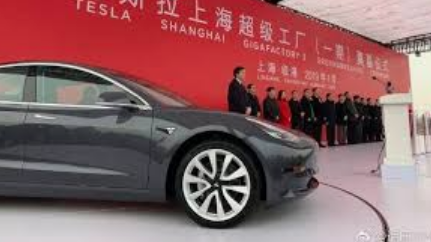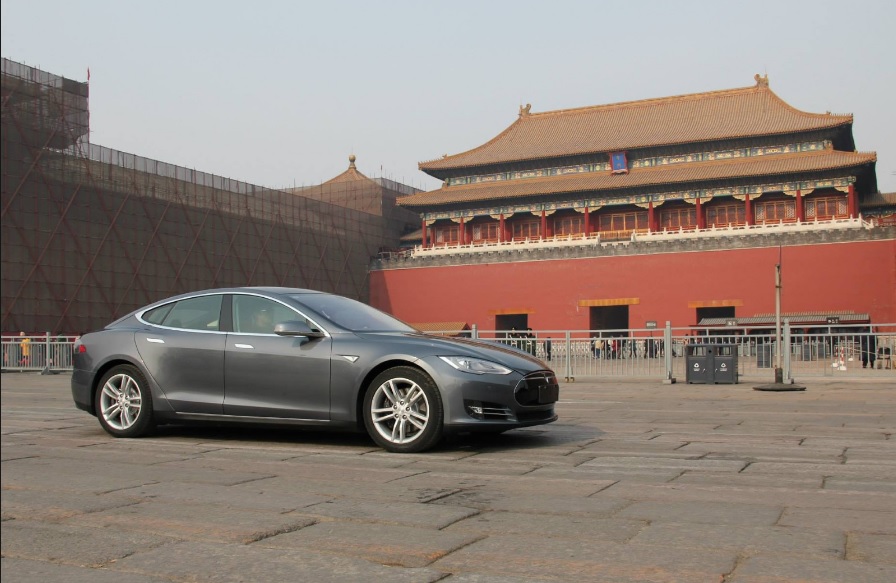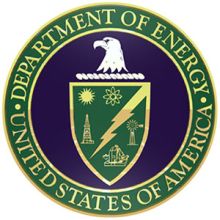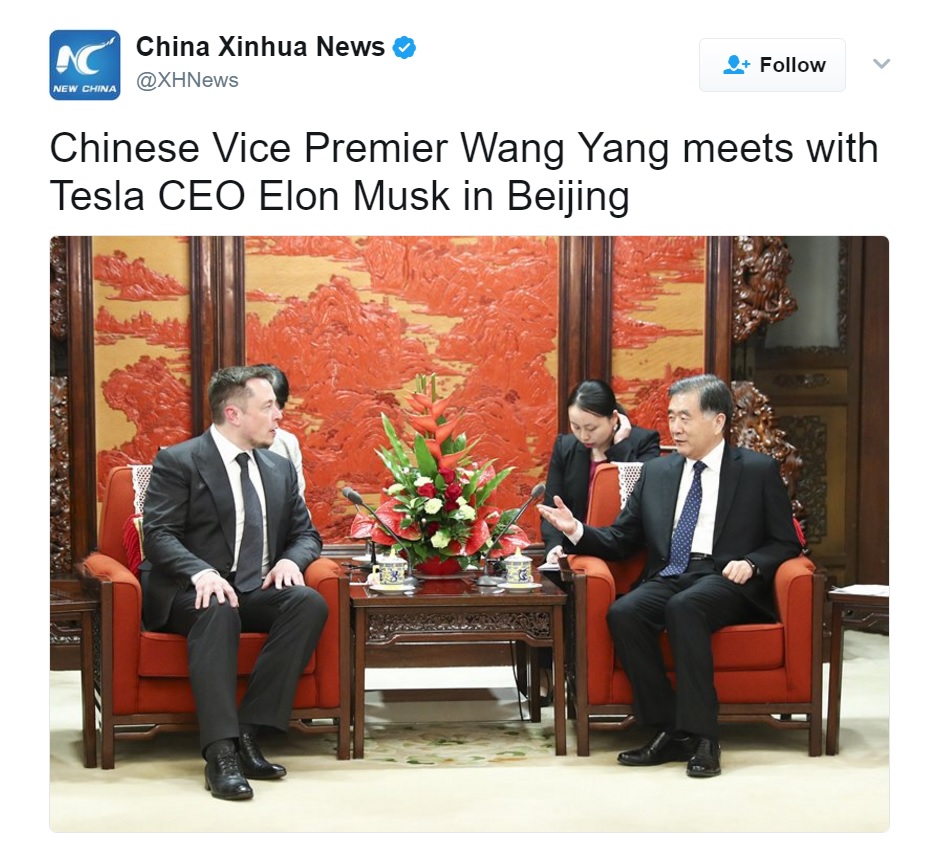Tesla Inc. is clearing hurdles in the China auto market during the Coronavirus pandemic. The company had 12,709 vehicle registrations in China in March, versus 2,314 in February, marking its highest-ever monthly sales in the world’s largest auto market, according to data from LMC Automotive. Overall new passenger car sales in March were down  40.8 percent from a year earlier in that market. On Friday, the company said it has started selling two more Model 3 variants built at its Shanghai plant. That means all the Model 3s sold in China are locally made and free of import tax.
40.8 percent from a year earlier in that market. On Friday, the company said it has started selling two more Model 3 variants built at its Shanghai plant. That means all the Model 3s sold in China are locally made and free of import tax.
Tesla plans to start delivering Long Range Model 3s starting in June, priced at 339,050 yuan after subsidies. The rear-wheel drive version, with a driving range of about 373 miles before needing to be recharged, will be priced at 439,900 yuan. The locally made Performance Model 3, for which deliveries are scheduled to begin in Q1 2021, will be priced 419,800 yuan, the California-based automaker said without specifying the price after subsidies.
Telling Your Story: Doing the math on buying your EV
Editor: So we have our first response to my request on sharing your stories on how you got absorbed into the topics of clean transportation, electric vehicles, alternative fuels, renewable energy, and the like. Thanks to Emile Rocher, a professional in efficient and sustainable buildings — and also an electric vehicle owner — for sharing her experiences with a Ford Focus electric and a Mitsubishi Outlander plug-in hybrid. For those of you interested in sharing your thoughts on sustainable transportation, you can send your comments to jlesage378@gmail.com; or you can leave it in the Comment box at the end of the newsletter.
After spending some 40 years building efficient buildings, when affordable grid tied PV came along some 7 years ago, we invested about $10,000 (Canadian dollars) in system equipment and installed it on a long weekend with the help of a couple friends. Ended up with a surplus of capacity becoming a net exporter which is contrary to the rules in oily Alberta, and were being paid half of retail cost in any case, which inspired us to purchase our first EV — a 2 year old deeply discounted Ford Focus with no km (range). Added another 1.5 KW to the system a few years ago and still had a surplus even while driving about 10,000 km/yr. So we parked our ancient oil burning Jetta and bought a plug-in Mitsubishi Outlander. The great AWD rig which will get 7 L/100 km (33.6 mpg) after the 50 km battery range is exceeded. Collectively these investments make the equity markets pale in comparison regarding risk and return. Our total electricity bill for one full year was $185 (Canadian dollars), electric driving included.
What really needs to be driven home in this oil vs renewable debate is economics. Oil for personal transportation at this time, disregarding the global risk of climate change, just can’t compete evenly with the multiple massive subsidies that industry enjoys. Even Exxon and Shell are buying solar electricity (2 cents/kw hr recently for Exxon) and using it as one of the many other energy inputs in producing liquid fuel.
Do the math — starting with the 30 miles in which a first-gen EV can travel on 7 KW hr of electricity. Remember that the oil industry used that much electricity in the refining process alone to produce one gallon of gasoline (source: Nissan). This business model makes as much sense as turning gold into lead at a huge cost. We need a comprehensive study on all the other collective inputs that go into turning the various sources of hydrocarbons into liquid fuel, and to publicize it as aggressively as the fossil industry lobbies politicians to keep the oil flowing.
—Emile Rocher
And in other news………..
Responding to Covid19: BYD Motors will pledge a donation of $1 million in medical supplies, including personal protective equipment (PPEs) and hand sanitizer to transit agencies and first responders in the US and Canada. The supplies include FDA-approved adult surgical masks and KN-95 respiratory protective devices, as well as hand sanitizer that is 99.999 percent effective. Several thousand PPEs have already been delivered to agencies that include the City of Los Angeles, the Valley Medical Center in San Jose, Calif., the Toronto Transit Commission, and the LA County Sheriff’s Department………… Hyundai Motor America has donated $100,000 and 10,000 coronavirus test kits to support drive-up testing in Detroit, part of a larger effort by the company to support 21 US drive-up sites. About 65,000 tests have also been donated to hard-hit areas like New Orleans, Chicago, and Detroit, the company said.
Supporting solar in USAF: Pvilion, a leading solar powered fabric provider, announced it has been awarded a Phase II Small Business Innovation Research (SBIR) contract by the United State Air Force (USAF) to continue its development of rapidly deployable, solar powered structures. SBIR enables small businesses to explore their technological potential and provides the incentive to profit from its commercialization. The USAF has favorably evaluated the products Pvilion presented for cost, complexity, sustainability, required manual labor, as well as for energy independence all with the goal of maximizing mission-objective readiness. The company says that its solar technology is significantly lighter and more adaptable than traditional solar options. It is integrated entirely into a system already being installed, such as for a tent, shade canopy, or hangar. With fully integrated photovoltaic fabric panels, Pvilion’s structures allow for the multi-capability use by providing power, shelter, lighting, and climate control. Pvilion’s commercial customers use its solar fabric technology in structures used for events such as music festivals, in temporary industrial worksites, and in structures found in parks, municipalities, universities, and corporate campuses. Military operations are a good fit, too. “We’re now working hard to quickly delivery solar structures to Airmen who need them most. In this challenging time, instant access shelter, power, and climate control is key. This project is very important to Pvilion and, I believe, the nation as whole,” said Colin Touhey, engineer and Pvilion CEO.
Fuel cells for marine vessels: ABB has signed a Memorandum of Understanding (MOU) with Hydrogène de France to jointly manufacture megawatt-scale fuel cell systems capable of powering ocean-going vessels. The agreement will establish a close collaboration on the assembly and production of the fuel cell power plant for marine applications. Building on an existing collaboration announced in 2018 with Ballard Power Systems, ABB and HDF intend to optimize fuel cell manufacturing capabilities to produce a megawatt-scale power plant for marine vessels. The new system will be based on the megawatt-scale fuel cell power plant jointly developed by ABB and Ballard, and will be manufactured at HDF’s new facility in Bordeaux, France.
DC charging for Kia Niro: Electrify America has made an agreement with Kia Motors America to offer ‘Kia Select,’ a new charging program with optimized pricing for the Kia Niro electric vehicle (EV) model on Electrify America’s direct current (DC) fast charging network. The program offers a flat rate of 35 cents per-minute charging for current Kia Niro EV drivers, designed specifically for the unique DC charging characteristics of the model. The program also waives session fees and has no subscription fees for participants. To participate in the program, drivers can simply download the Electrify America charging app and complete a brief enrollment process. Drivers can also use the app to locate Electrify America charging stations, start a charging session, and remit payment using their credit or debit card entered during the registration process.

 indicating whether an agreement has been met. Those talks were reported to have been underway earlier this year. Tesla would still have to pay the 25% import fee that it’s had all along in China, but the company would have costs reduced not having to ship the cars into that market. It would also allow Tesla to stay true to its identity of being an independent operator by avoiding the traditional joint venture with a Chinese automaker that Tesla’s competitors have been doing for years. China is becoming more flexible to grow its local EV market and remain No. 1 globally, to clean up air pollution in its growing cities, and to free up the nation from foreign oil imports. The electric carmaker has been moving in this direction in recent years, with CEO Elon Musk thinking that it’s the most significant market in the world for company growth. The company now has a 5% stake from Chinse internet company Tencent Holdings, which should support Tesla’s strategy in that market.
indicating whether an agreement has been met. Those talks were reported to have been underway earlier this year. Tesla would still have to pay the 25% import fee that it’s had all along in China, but the company would have costs reduced not having to ship the cars into that market. It would also allow Tesla to stay true to its identity of being an independent operator by avoiding the traditional joint venture with a Chinese automaker that Tesla’s competitors have been doing for years. China is becoming more flexible to grow its local EV market and remain No. 1 globally, to clean up air pollution in its growing cities, and to free up the nation from foreign oil imports. The electric carmaker has been moving in this direction in recent years, with CEO Elon Musk thinking that it’s the most significant market in the world for company growth. The company now has a 5% stake from Chinse internet company Tencent Holdings, which should support Tesla’s strategy in that market. to enable growth in fast charging. It includes electrification projects that will support the development and verification of electric drive systems and infrastructure for what it defines as “extreme fast charging” (400-kW). It’s being done through the DOE’s Vehicle Technologies Office (VTO), which funds early-stage, high-risk research to support improved vehicle efficiency, lowers costs, and increases use of secure, domestic energy sources. It’s part of a VTO-funded report that will be released today, where researchers at Idaho National Laboratory, Argonne National Laboratory, and the National Renewable Energy Laboratory identified technical gaps to bring an extreme fast charging network to the U.S. The
to enable growth in fast charging. It includes electrification projects that will support the development and verification of electric drive systems and infrastructure for what it defines as “extreme fast charging” (400-kW). It’s being done through the DOE’s Vehicle Technologies Office (VTO), which funds early-stage, high-risk research to support improved vehicle efficiency, lowers costs, and increases use of secure, domestic energy sources. It’s part of a VTO-funded report that will be released today, where researchers at Idaho National Laboratory, Argonne National Laboratory, and the National Renewable Energy Laboratory identified technical gaps to bring an extreme fast charging network to the U.S. The  few of its models in plug-in hybrid form already. The company has sold 1,373 units of the 3-series plug-in hybrids in the US, this year through May, according to HybridCars’ Dashboard. An all-electric 3-series would join the BMW i3 as another BMW battery electric model. Months ago, BMW CEO Harald Krueger said that the company would be making a push toward more electrification and connected features. Sales of the i3 have not been as strong as Tesla and Chevy models; and sales of the i8 supercar have been weak lately. The 3-series is one of the most popular BMW models, which could help spike its electric car sales.
few of its models in plug-in hybrid form already. The company has sold 1,373 units of the 3-series plug-in hybrids in the US, this year through May, according to HybridCars’ Dashboard. An all-electric 3-series would join the BMW i3 as another BMW battery electric model. Months ago, BMW CEO Harald Krueger said that the company would be making a push toward more electrification and connected features. Sales of the i3 have not been as strong as Tesla and Chevy models; and sales of the i8 supercar have been weak lately. The 3-series is one of the most popular BMW models, which could help spike its electric car sales. If you
If you